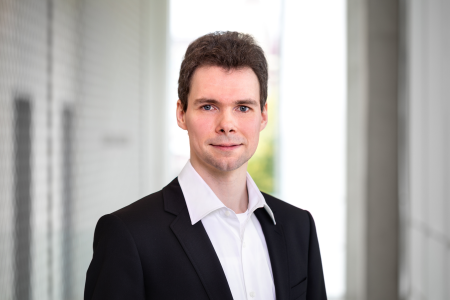Raphael Wittkowski is the new physics professor at DWI

On April 1, 2025, physicist Raphael Wittkowski accepted a joint appointment from RWTH Aachen University and DWI – Leibniz Institute for Interactive Materials (DWI) for the Heisenberg professorship “Theory of Active Soft Matter”. The 36-year-old is thus expanding the research spectrum of the Aachen-based Leibniz Institute to include a new, strategically important focus.
How can fundamental insights into the properties of active soft materials be used for their possible applications in medicine, materials science and mechanical engineering? This is one of the central questions that Raphael Wittkowski will now address in Aachen. His research group will focus on various aspects of the theory of active soft materials. This includes, among other things, the study of microscopically small machines that can move like miniature submarines with their own propulsion (sonically propelled microparticles). One idea in this innovative field of research is to use the microparticles as transporters for medical agents in the future and to release them at a desired location in the human body.
New insights through computer simulations
“Computer simulations are a major part of our work. The experimental research groups at the DWI and our work complement each other very well because simulations are an important addition to laboratory experiments. A simulation models a real physical system, such as a microrobot or a material, on the computer. This makes it possible, for example, to examine a material on the computer as it would be in the laboratory. Computer simulations and laboratory experiments have different advantages and disadvantages,” says Raphael Wittkowski.
One advantage of computer simulations is that they enable scientists to study systems that would be very difficult or even impossible to realize in a laboratory experiment. Raphael Wittkowski gives an example: “A few years ago, I wanted to find out to what extent the drive speed of a microparticle driven by sound depends on how viscous the liquid it is in is. We refer to this viscosity as viscosity. In simulations, we changed the viscosity value of the liquid several times and looked at how the drive velocity of the microparticle changed as a result. This was relatively easy: we just had to type a different number at one point in the simulation code to change the value of this parameter and run the simulation again with the changed value. In an experiment, on the other hand, it would not have been possible to change the viscosity of the liquid so quickly and on its own.” In the laboratory, viscosity could be changed by heating the liquid, but this would simultaneously change the temperature in the system and thus other parameters such as the density of the liquid. So too much in the system changes at once, and the influence of viscosity alone cannot be easily observed. One alternative is to replace the liquid with another that has the desired viscosity. However, other properties of the liquid, such as density or speed of sound, would then also be different.
This example gives an idea of how Raphael Wittkowski and his colleagues can find answers to complex questions. In addition to computer simulations, they also use software development, modeling and method development.
Strategic key expertise for the DWI
The appointment of Raphael Wittkowski to the W3 professorship is a major milestone for the further development of the Aachen-based Leibniz Institute: the DWI has anchored the use of the potential of data-driven simulation in its future strategy in order to be able to develop materials with specific properties and functions. The aim is to establish data-driven interactive material simulation as a new key expertise at the DWI. This goal can be achieved with the appointment of Raphael Wittkowski. His addition to the scientific team complements the diversity of scientific disciplines already represented at the institute with data science, simulation and physics. In addition, his work further strengthens interdisciplinary cooperation in the existing fields of expertise.
From Münster to Aachen
Before his position in Aachen, Raphael Wittkowski, who is currently 36 years old, worked as a junior professor at the Institute for Theoretical Physics at the University of Münster. There he previously led an Emmy Noether junior research group on the topic “Controlling the dynamics of active colloidal liquid crystals by external fields”. His research to date has led to the discovery of several new effects and material properties of active soft materials, the invention of a new type of light-driven microparticle, and the development of new scientific software. Raphael Wittkowski is internationally recognized for his contributions to the theory of active matter and statistical physics. He is considered a leading scientist in the field of computer simulations of sound-driven microparticles.
The renowned Heisenberg professorship of the German Research Foundation (DFG) is part of the Heisenberg funding program. With the Heisenberg professorship, the DFG provides temporary funding for a professorship (W2 or W3) at a German university and flexible research funds. The Heisenberg professorship enables scientists to establish themselves as professors at a German university.
The DWI is a research institute of the Leibniz Association, funded by the German federal and state governments, based in Aachen. On January 1, 2014, the institute was the first Aachen-based institute to be accepted into the Leibniz Association. It developed from the German Wool Research Institute, which was founded in 1952. Today, the DWI is an internationally visible and interdisciplinary research institute in the field of materials science with core competencies in chemistry, biotechnology, physics, and process engineering.
